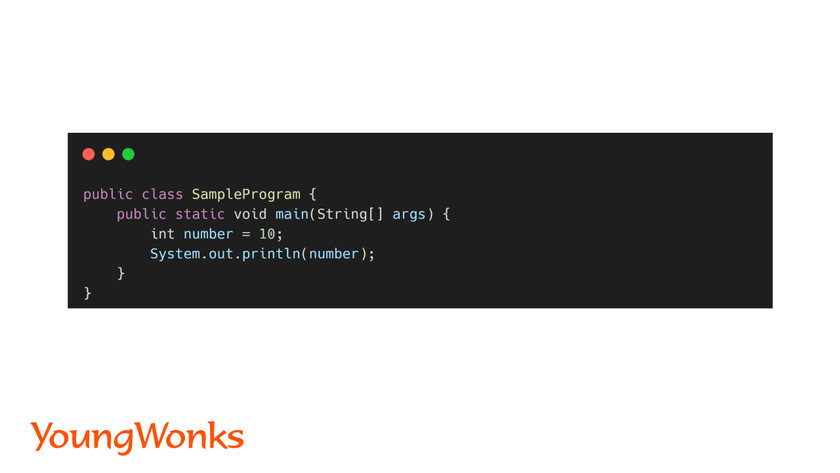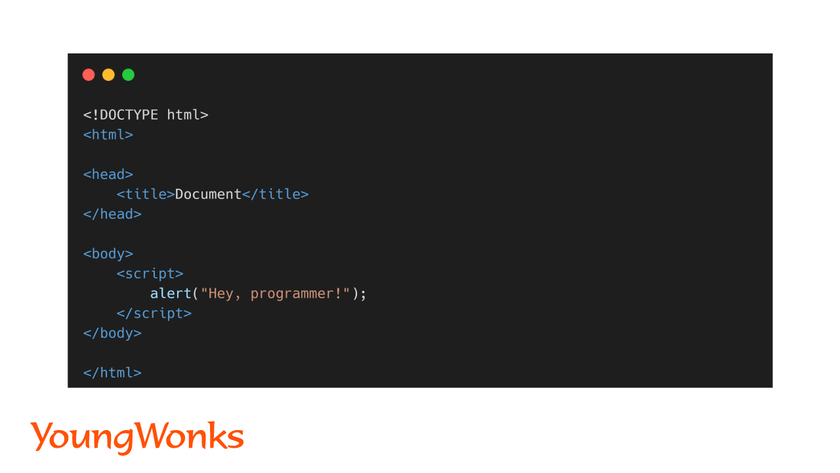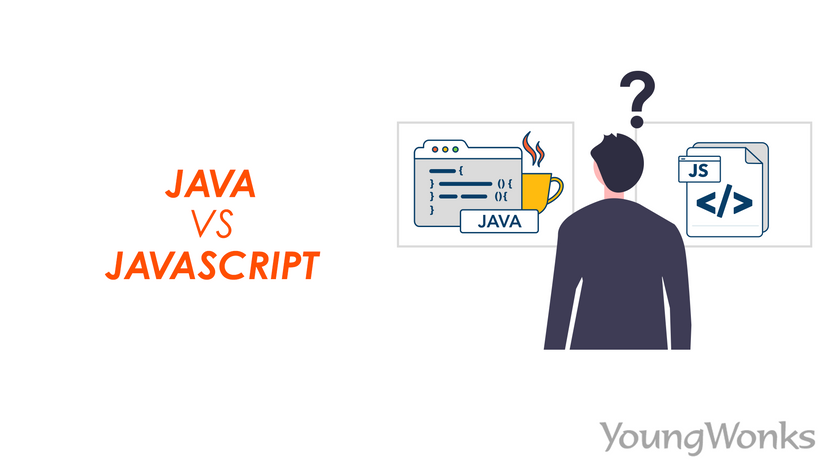Jul 21, 2022 By Team YoungWonks *
Introduction
In this blog, we will discuss two of the most popular programming languages: Java and JavaScript. Whenever we search for programming tutorials on the Internet, we always find these two languages and many of us get confused if they are the same. Probably, you are one of them and hence landed on this Java vs JavaScript blog that will help you understand their similarities and differences. We will start from the very basics and then move to advanced concepts in each of these programming languages. To read this blog in brief, you can also refer to the cheatsheet available on https://www.youngwonks.com/resources/java-vs-javascript
Java vs JavaScript: Compiled or Interpreted
Java: Source code and Bytecode
Java, founded by James Gosling, appeared in May 1995. The first Java compiler was developed by Sun Microsystems. In case you are wondering what is a compiler, let’s understand how Java works.
- Java is developed to let the software engineers write platform independent code. This code, also known as source code, can be written on any machine (for example Linux, Windows or macOS).
- Since computers do not understand code written in English, Java provides a way to convert this code into machine understandable code called bytecode. This conversion is done by compiler that comes with the Java Development Kit (JDK).
- The important point to note here is that such compilers were available even before Java but they could not generate platform independent code. That means, apps or programs written in Java can run on any platform without the need to compile them again. This offers write once, run anywhere approach to the programmers.
- Running Java bytecode requires the machine to have Java Runtime Environment (JRE) that, behind the scenes, uses JVM (Java Virtual Machine) to run the bytecode.
- The programmer must have the Java Development Kit (JDK) on the system and the people who just need to run the bytecode must have Java Runtime Environment on the system. They can install the JDK if they want because it comes with JRE and development tools.
JavaScript: No compilation initially
JavaScript appeared in December 1995, just a few months after Java. It was developed by Netscape Inc. as a scripting language. Below are some of the reasons why such scripting language was required.
- That time, the Internet connectivity was very slow and in case you were supposed to fill a website form, the validation of this data required a round trip to the backend.
- If the validation failed, you had to fill the entire form again.
In contrast to Java, this programming language had no compilation step. JavaScript code was interpreted at run time by the web browser so that the code executed line by line to show the results immediately. However, with time, performance became an issue. For example, if you were calling a function in a loop, it could get really slow. To fix performance issues, browsers now use JIT compilers for just-in-time compilation. JavaScript is still considered an interpreted language since the compilation is handled at run time not ahead of time.
Java vs JavaScript: Syntax
Every Java program must have its code organized in classes. Look at a very basic Java program:

In the above code, System.out.println(number); prints the data stored in the number variable.
On the other hand, JavaScript is used with HTML and CSS for front end development. The following code explains how this client side scripting language helps us get an alert on the webpage when it is loaded.

Let’s observe the key differences in the syntax.
- Java wants the programmer to write the code inside classes (also known as encapsulation) while JavaScript wants the programmer to write code inside the script tags or inside a separate file with .js extension.
- Even though both the languages offer object-oriented programming (OOP), the Java programmer must write at least one class in the code.
- Since Java is a compiled language, the syntax errors are reported when the code is compiled. On the other hand, JavaScript reports an error when the current line to be executed has any syntax problem.
Java vs JavaScript: Data Types
Java allows the programmer to use eight primitive types (e.g. int, float, double) and built-in classes. Whenever data needs to be stored, the programmer must declare the variable and specify the data type. On the other hand, JavaScript is a dynamic typed language. In JavaScript, we can store values of any type in the variable and it won‘t complain.
Java vs JavaScript: Frontend usage
Java applications include stand-alone applications, web applications, mobile applications and enterprise applications. Java offers applets that are special programs embedded in the webpage to create dynamic content. However, the modern web browsers do not support Java applets and instead rely on JavaScript code. Java is still in demand in the mobile app development sector and helps the programmers develop Android apps.
In frontend development, JavaScript is used with HTML and CSS to develop dynamic and responsive web pages. There are built-in APIs (like Geolocation API) that can be used by the developers according to their needs. There are hundreds of libraries and frameworks based on JavaScript that offer functionalities for frontend developers and full stack developers. For example, ReactJS framework by Facebook and Angular framework by Google let the web developers create components for reusability.
Java vs JavaScript: Backend usage
For backend development (also known as server-side development), Java has a host of frameworks and this object-oriented programming language is widely used to develop enterprise level web applications. Some of the backend frameworks include
- Spring
- Grails
- Hibernate
- Struts
On the other hand, JavaScript was initially used only for frontend development. Now, because of Node.js, a web developer can use JavaScript even for backend development. It is an advantage to use this language for backend because
- It is a light weight scripting language
- It offers dynamic typing, object oriented programming support, client side validations and has many other features for web development
Java vs JavaScript: Multithreading
A set of instructions that can be scheduled for execution is called a thread. The process of running such threads simultaneously is known as multithreading.
In Java, all the programs have at least one thread (called the main thread) provided by the JVM (Java Virtual Machine). Each thread has its own program counter, stack and local variables to maintain parallel concurrency. However, JavaScript is a single-threaded, non-blocking, asynchronous and concurrent programming language. In simple words, it means that
- JavaScript offers one stack and doesn’t wait for a task to get completed
- It keeps a queue of the tasks and executes them one by one
- Whenever a task starts waiting for an external resource, JavaScript jumps to the next task
- When the external operation is done, the task is added again to the queue for further execution
Summary
Even though there are languages like PHP and Python, Java and JavaScript remain in the top five programming languages. They might sound similar but they have their own advantages.
- Java is a compiled language but modern JavaScript makes use of both compilation and interpretation
- These two languages offer object-oriented programming approach for software development and web development
- Java is a strongly typed language while JavaScript is not
- Both of them make use of polymorphism to reuse code
The major differences start to get visible when a programmer needs to pick one of the two. For web development, beginners should start from HTML and CSS before they learn JavaScript. Some of the JavaScript frameworks like ReactNative and Flutter offer Java’s write once, run anywhere approach to build apps for desktop, iOS and Android devices. For software development, one should learn languages like Python and JavaScript first before moving to Java as it is relatively difficult to learn.
For web development, you can read our following blogs:
- Introduction to Frontend Development https://www.youngwonks.com/blog/What-is-Back-End-Development
- HTML and CSS — Design and Build Websites https://www.youngwonks.com/blog/HTML-and-CSS-Design-and-build-websites
To get started with Java, you can read our following blog:
- Introduction to Java and Processing https://www.youngwonks.com/blog/Introduction-to-Java-and-Processing
*Contributors: Written by Rohit Budania; Lead image by Shivendra Singh

